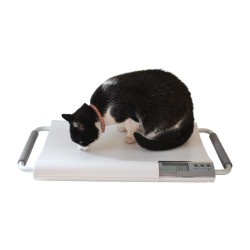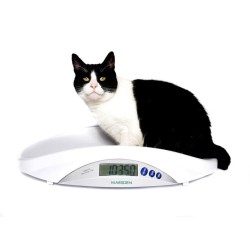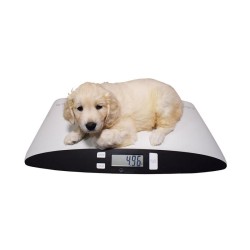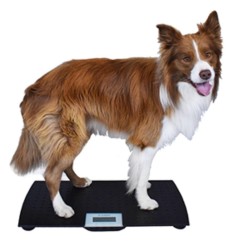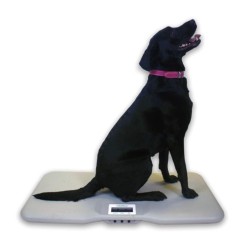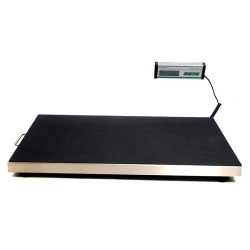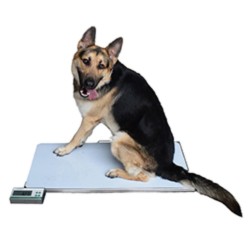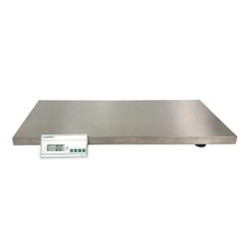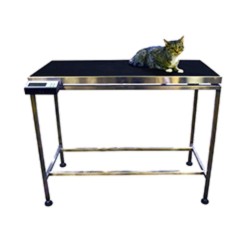Veterinary Scales
There are 9 products.
Active filters
About Veterinary Scales
Precision Animal Weighing for Veterinary Clinical Care
Veterinary scales provide specialised weighing equipment designed specifically for animal healthcare, serving veterinary surgeries, animal hospitals, grooming centres, and animal welfare organisations throughout England, Scotland, Wales, and Northern Ireland. These purpose-designed weighing devices feature appropriate platform sizes accommodating varied animal dimensions, non-slip surfaces ensuring safe animal positioning, accurate weighing mechanisms supporting clinical decisions, and hygiene-conscious designs facilitating thorough cleaning between uses. Veterinary practices rely on professional scales for monitoring patient weight supporting health assessment, medication dosing calculations ensuring appropriate drug quantities, anaesthetic dosage calculations preventing under or over-dosing, tracking weight changes indicating illness or treatment response, and nutritional assessment supporting dietary recommendations. Modern veterinary scales incorporate features including varied platform sizes from small animal scales for cats and small dogs through to large animal scales for horses and livestock, tare functions enabling weighing in carriers, clear displays readable during active animal weighing, and robust construction withstanding animal movement and moisture. The provision of appropriate veterinary scales supports evidence-based animal care through accurate clinical data, enables safe medication and anaesthetic management, and demonstrates professional veterinary practice meeting clinical standards across animal healthcare environments.
The implementation of professional veterinary scales directly supports veterinary practice quality through accurate clinical assessment, safe medication management, and demonstration of appropriate equipment provision meeting professional standards. Inaccurate animal weighing compromises veterinary care through incorrect medication dosing potentially causing treatment failure or toxicity, inappropriate anaesthetic doses risking patient safety, and failure to detect significant weight changes indicating disease progression or treatment effectiveness. Professional veterinary scales address these challenges through accurate consistent measurements across the animal weight range, appropriate platform designs accommodating various animal sizes and temperaments, stable weighing despite animal movement, and hygienic surfaces preventing cross-contamination between patients. Clinical applications include routine health checks establishing baseline weights, pre-operative weighing supporting anaesthetic planning, medication dispensing ensuring accurate dosing, weight management programmes monitoring progress, and diagnostic investigations where weight changes provide clinical clues. Veterinary practices benefit from reliable weighing equipment through confident clinical decision-making, reduced medication errors preventing patient harm and regulatory issues, and professional reputation built on quality equipment. Modern veterinary scales incorporate safety features including non-slip platforms preventing animals slipping, stable bases resisting tipping if animals move suddenly, and appropriate height preventing injury if animals jump down throughout England, Scotland, Wales, and Northern Ireland.
Selecting and implementing veterinary scales requires assessment of practice needs, appropriate equipment specification, and establishment of quality weighing protocols across veterinary facilities throughout the UK. Veterinary practices should evaluate typical patient sizes determining required platform dimensions and weight capacities, assess clinical requirements identifying needs such as very high accuracy for small animal medication, and consider practical factors including available space, hygiene requirements, and budget. Equipment selection should prioritise scales designed specifically for veterinary use, appropriate capacity for typical patients typically separate scales for small animals (up to 50kg) and large animals (up to 300kg or more), platform dimensions accommodating animal sizes safely, and materials facilitating thorough cleaning and disinfection. Implementation protocols must encompass staff training on proper scale operation including techniques for weighing anxious or aggressive animals safely, tare procedures for weighing in carriers when necessary, and appropriate result interpretation. Quality assurance measures should include regular calibration maintaining accuracy, documented maintenance records, cleaning and disinfection protocols between patients preventing disease transmission, and monitoring of weighing-related incidents. Modern veterinary scales incorporate features such as hold functions capturing weight despite animal movement, data connectivity transferring weights to practice management systems, and animal-friendly designs reducing stress. Veterinary practices should establish weighing protocols standardising procedures across veterinary surgeons and nurses, determine appropriate weighing frequencies for different clinical scenarios, and integrate weights into clinical decision-making particularly for medication dosing. Staff should develop techniques for safe animal handling during weighing including appropriate restraint methods, recognition of stress signals necessitating modified approaches, and emergency procedures if animals react adversely. Hygiene protocols should emphasise thorough cleaning between patients, particular attention to potentially infectious cases, and appropriate disinfectant selection effective against animal pathogens whilst safe for scales. By maintaining calibrated professional veterinary scales and implementing appropriate weighing protocols, veterinary practices throughout England, Scotland, Wales, and Northern Ireland demonstrate their commitment to professional standards, patient safety through accurate medication management, clinical excellence through evidence-based assessment, and appropriate equipment provision supporting optimal animal healthcare outcomes through reliable weighing enabling accurate clinical decisions across all veterinary patients.

